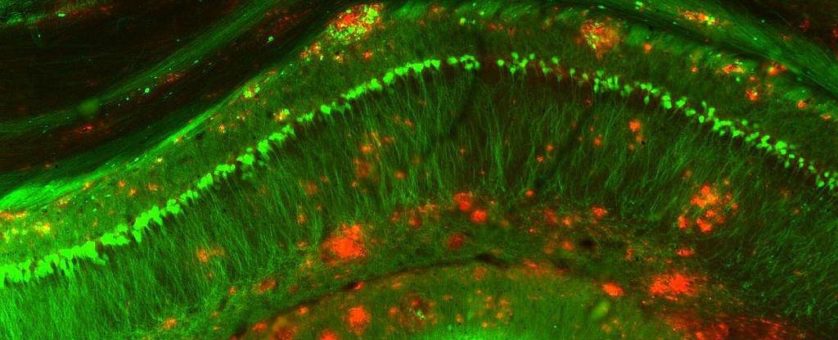IL-33 ameliorates Alzheimer’s disease-like pathology and cognitive decline
- Amy K. Y. Fua,b,c,
- Kwok-Wang Hunga,b,c,
- Michael Y. F. Yuena,b,c,
- Xiaopu Zhoua,b,c,
- Deejay S. Y. Maka,b,c,
- Ivy C. W. Chana,b,c,
- Tom H. Cheunga,b,c,
- Baorong Zhangd,
- Wing-Yu Fua,b,c,
- Foo Y. Liewe,f,1, and
- Nancy Y. Ipa,b,c,1
- Contributed by Nancy Y. Ip, March 15, 2016 (sent for review February 6, 2016; reviewed by David Morgan and Luke A. J. O’Neill)
Significance
Dysfunction of the innate immune system is involved in the pathogenesis of Alzheimer’s disease (AD); however, the pathophysiological mechanisms underlying these dysfunctions are unclear. Here we report that stimulation of IL-33/ST2 signaling rescues memory deficits and reduces the accumulation of β-amyloid in APP/PS1 mice that exhibit select pathologies associated with AD. Although impaired IL-33/ST2 signaling is associated with early progression of AD, IL-33 injection rescues contextual memory deficits and reduces the accumulation of β-amyloid in APP/PS1 mice. IL-33 skews the microglia toward an alternative activation state with enhanced Aβ phagocytic capacity and elevated antiinflammatory gene expression, which results in a decreased proinflammatory response in the brain. Thus, this study suggests that IL-33 can be developed as a new therapeutic intervention for AD.
Abstract
Alzheimer’s disease (AD) is a devastating condition with no known effective treatment. AD is characterized by memory loss as well as impaired locomotor ability, reasoning, and judgment. Emerging evidence suggests that the innate immune response plays a major role in the pathogenesis of AD. In AD, the accumulation of β-amyloid (Aβ) in the brain perturbs physiological functions of the brain, including synaptic and neuronal dysfunction, microglial activation, and neuronal loss. Serum levels of soluble ST2 (sST2), a decoy receptor for interleukin (IL)-33, increase in patients with mild cognitive impairment, suggesting that impaired IL-33/ST2 signaling may contribute to the pathogenesis of AD. Therefore, we investigated the potential therapeutic role of IL-33 in AD, using transgenic mouse models. Here we report that IL-33 administration reverses synaptic plasticity impairment and memory deficits in APP/PS1 mice. IL-33 administration reduces soluble Aβ levels and amyloid plaque deposition by promoting the recruitment and Aβ phagocytic activity of microglia; this is mediated by ST2/p38 signaling activation. Furthermore, IL-33 injection modulates the innate immune response by polarizing microglia/macrophages toward an antiinflammatory phenotype and reducing the expression of proinflammatory genes, including IL-1β, IL-6, and NLRP3, in the cortices of APP/PS1 mice. Collectively, our results demonstrate a potential therapeutic role for IL-33 in AD.
Um novo estudo publicado na revista Proceedings of the National Academy of Sciences descobriu que uma injeção de uma proteína chamada de IL-33 pode reverter os sintomas de Alzheimer e declínio cognitivo em ratos, restaurando sua memória e função cognitiva a níveis saudáveis, em apenas uma semana.
Os ratos foram criados para desenvolver uma doença parecida com o Alzheimer em humanos, que progredia à medida que envelheciam.


No comments:
Post a Comment